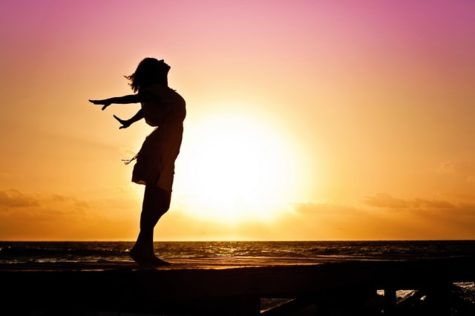BUFFALO — When it comes to seeking solitude, many people often blame mental health issues as an underlying cause. But a new study finds that being alone has its benefits too, particularly when it comes to people looking for a surge of creativity.
Researchers at the University of Buffalo interviewed 295 privacy-valuing individuals who reported a variety of reasons for their tendency to spend a lot of time alone, ranging from feeling fear or anxiety around others to preferring to use spare time working on a craft.

Although research has traditionally suggested that excessive time alone can be unhealthy, some seclusive pursuits, such as trying to connect to nature or get a better sense of self, can be constructive, the researchers found.
“We have to understand why someone is withdrawing to understand the associated risks and benefits,” says Julie Bowker, the study’s lead author, in a university release.
“When people think about the costs associated with social withdrawal, oftentimes they adopt a developmental perspective,” she continues. “During childhood and adolescence, the idea is that if you’re removing yourself too much from your peers, then you’re missing out on positive interactions like receiving social support, developing social skills and other benefits of interacting with your peers.”
Bowker believes that the presumed downsides of being alone and withdrawing have lent such a preference a hard-to-erase stigma.
More recent research, including this latest study, has begun to recognize the potential benefits of alone time — provided it’s an intentional choice prompted by positive emotions.
Deeming individuals who follow such guidelines “unsociable,” Bowker explains that they may enjoy reading, working on the computer, or otherwise spending precious time alone.
Importantly, unsociable individuals, whether young and old, are not at increased risk of experiencing negative health outcomes. In fact, the researchers found that they may enjoy a special benefit: improved creativity.
“Although unsociable youth spend more time alone than with others, we know that they spend some time with peers. They are not antisocial,” Bowker emphasizes. “They don’t initiate interaction, but also don’t appear to turn down social invitations from peers. Therefore, they may get just enough peer interaction so that when they are alone, they are able to enjoy that solitude. They’re able to think creatively and develop new ideas — like an artist in a studio or the academic in his or her office.”
Other, less healthy forms of isolation include social avoidance (i.e., choosing to withdraw due to fear), and social withdrawal (i.e., shyness), she notes.
While these two forms may overlap with unsociability, neither would appear to confer the benefits of the latter.
“Over the years, unsociability has been characterized as a relatively benign form of social withdrawal,” Bowker concludes. “But, with the new findings linking it to creativity, we think unsociability may be better characterized as a potentially beneficial form of social withdrawal.”
The study’s findings were published Personality and Individual Differences.

I have a tenant that texts me often. it drives me nuts. i finally told him to only text the important things; like, “the house is on fire!” I’m an anomaly. I’m a reclusive extrovert.
The majority of relationships I have had required me to forgo personal goals of mine to satisfy the wants of others. I actually enjoy knowing others but prefer living in my own space alone to follow my own goals without being subject to disdain for not dropping everything to the likings of another.
I’ve often wondered about my intense desire for solitude even thought I’ve been married for 37 years. Every job I’ve enjoyed has been one where I was given my assignments and turned loose to complete them alone or a night shift where I took care of the department responsibilities while everyone else went home. Working a day shift only meant navigating the myriad confilicts and alliances a group of people engender. Now, as a rancher, I could not be happier as we have no “hands” other than the kids when I’m up against something too big for one person to handle or working livestock. Renovating the old ranch house, rebuilding fences and repairing the equipment satisfies the need for creatvity. As a pre-teen on my uncle’s ranch hunting and fishing on my own was my greatest joy once my uncle taught me the rules of using firearms and what to watch out for in the pastures. It taught me personal responsibility and observing nature was often more enjoyable than afternoon comedies when I was there. It was “real”. I got my first deer, pretty much alone, when I was 9. The 60s was the last great “hurrah” before civilization began it encroachment in every aspect of our lives.
I moved 20 times by the time I turned 18, and a few times after that while in the military, so the concept of “peers” in in my life is fairly non-existent. I’ve never been back to a single high school reunion, even though asked many times, and have not stayed in contact with any but a small handful of those I grew up around. I did struggle with intense shyness as a young person but this has waned over the years. At 60 now it was a big surprise to discover that I could keep up with the old guys in the barber shop telling tales last year. Apparently I’ve “arrived”. The few times we make it to large cities like those of East Texas simply reinforce the idea that we, collectively, have gone over a precipice about 30 or so years ago and the frog has been thoroughly boiled in its pot. This is not sustainable for much longer and I thank God every day that I no longer live in one of them.
Alone time is huge. I find most people to be emotionalist sheep, and generally clueless about an astonishing range of subjects. The value of interaction outside of work is overrated. It is necessary, yes, but overrated. A much smaller group of close people is far better than everyone liking you, which in most instances is really just another way of saying you’re full of crap.
STFU and leave me alone
Women’s liberation limited the male role. Once your wife starts treating you like a child and not a man; the marriage is over. TV commercials; who is the dumbest person in the commercial? White Male. You wonder why the market for robotic sex dolls are increasing? The future looks like a f**king hell-hole thanks to Liberals.
I ignore these studies. In the past I’ve read that being alone was bad for you. This is sort of like coffee is good/bad/good depending upon the latest studies. Too many PH.D’s with waay to much time on their hands.
This group’s getting too large. I gotta get out of here.
Let’s keep this discussion simple. It’s all about space and who is in charge of your space. Those who are conventional allow others to manage their space. Those who are inventional manage their own space. When we are in our creative mode we treasure hoarding our space. When we feel like it, we can open our space up for others to convene. There is a time for keeping your space and a time for giving it up or sharing it. End of message. It is not an either or situation. It can be both.
Or it’s about time and who manages yours.
I have a very intense sales job. I have many friends and date often. When I have a weekend alone with a little “to-do” list, I am happy as a kid on Christmas. Time to read, refinish furniture, cook a great meal, watch home improvement shows, plan, work-out, shop, call friends, pay bills, take a nap. I could go on. I don’t know were this fear of being alone comes from. I cherish time to be alone. I love it.